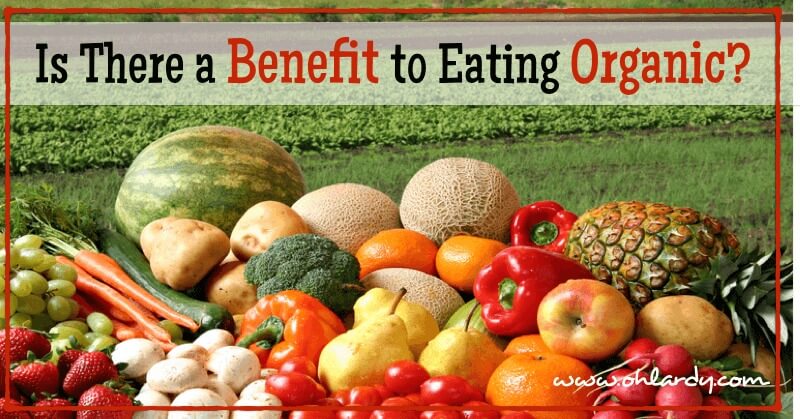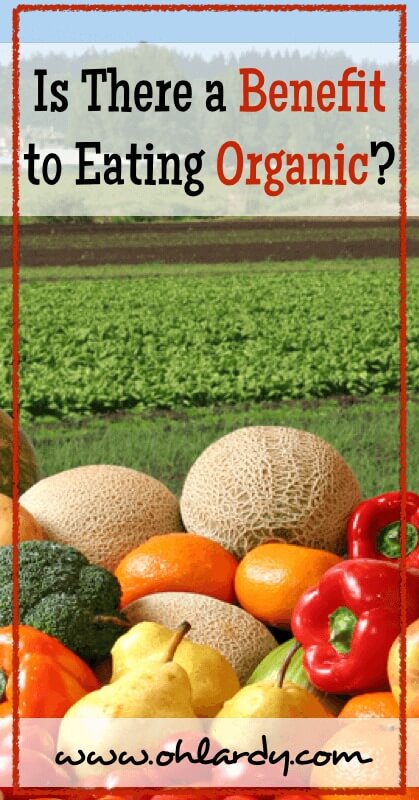What is the Benefit of Eating Organic?
Oh Lardy! is a participant in the Amazon Services LLC Associates Program, an affiliate advertising program designed to provide a means for us to earn fees by linking to Amazon.com and affiliated sites.

I am sure you have seen by now the big study from Stanford that came out September 4th stating that “The published literature lacks strong evidence that organic foods are significantly more nutritious than conventional foods.” (source) Almost every media outlet carried some sort of headline such as “Organic Foods No Better For You” and “Study Sees No Nutritional Edge in Organic Food.” Pretty exciting headlines, for sure! (Not quite as exciting as last week's “Egg yolks are as bad for you as smoking” but still, very attention grabbing!)
In this study, researchers at Stanford examined 200+ studies, combined the data and performed a variety of statistical analyses to see if organic foods were any more nutritious than conventional foods. And, they found that there really wasn't much difference in the nutrition level of these foods.
What do you think? What is the Benefit of Eating Organic?
It's definitely an interesting study and brings up a lot of questions. There has always seemed to be back and forth over whether organic foods were any more nutritious, ie. does an organic carrot have more vitamins/minerals than a conventional carrot? According to this study, no it does not.
I will admit that I found the results of this study somewhat surprising although I do think the study was fairly limited. Even with these results, I will still try to buy organic, organically grown or local produce, meat and dairy. Why? Whether or not organic food is more ‘nutritious' is not the top reason I buy organic foods.
I think this study left out a few things that I find beneficial about buying organic, organically grown and local. According to the NY Times, the study's senior author, Dr. Dena Bravata, commented that most people do not buy organic food because it is more ‘nutritious', that there are other areas that drive people to choose organic. (source) Here are some of the reasons I still choose organic and organically grown foods:
1. Organically grown food DOES have less pesticide residue (30% less according to the study). While the level of pesticides on conventional foods was found to be within safety levels set by the EPA, I feel it is important to limit the exposure to myself and my family.
2. Organically grown food DOES NOT contain GMOs. GMOs are genetically modified organisms where the genes from one species have been inserted into another species. The ones most prevalent in the US are corn, soy, canola, sugar beet, cotton (cottonseed oil), some zucchini/yellow squash, Hawaiian papaya. (source) Conventional meat and dairy will contain GMOs since the animals are generally fed with feed containing GMO foods. GMOs are very controversial and have not been proven to be dangerous. (However, they have not been proven safe, either). The jury is still out on that, but all of Europe, Great Britain Australia, Russia and Japan require labeling of GMOs (source) and many claim that some studies show they may be dangerous. (source) Because GMOs are so prevalent in our country, I know I can not realistically avoid them entirely, but choosing organically grown foods, I avoid them as much as possible.
3. Organically raised meat and dairy DO NOT contain added hormones and antibiotics. Given that 80% of antibiotics used in this country are used for our animals (source), I am not interested in passing along these residues to myself or my family.
4. According to the USDA, organic food DOES NOT contain artificial colors (made from coal tar and petroleum), antibiotics, artificial growth hormone, high fructose corn syrup, artificial sweeteners derived from chemicals, genetically engineered proteins, synthetically created pesticides and fertilizers, sewage sludge and can not be irradiated. (source and source) I try to avoid these things in my food for numerous reasons. (I would like to limit my use of sewage sludge and irradiated food, for sure! Yum, sewage sludge. Every time I read ‘sewage sludge' I still can't believe that is actually a criteria.)
5. According to the Stanford Study, the risk of antibiotic resistant bacteria is less in organic pork and chicken (source). (I always like to lower my risk of antibiotic resistant bacteria.)
Personally, I'd like to see if there is a difference in the nutritional value of organic food that is produced far away (i.e. peppers from Israel, mangoes from Mexico) and shipped to our local stores vs. organic food that is grown locally and eaten quickly. I think that could be an interesting study!
Dr. Bravata said that many reasons (other than organic food being more nutritious), such as the ones above and also environmental factors are all perfectly valid reasons for people to choose to buy organic foods. (source)
In conclusion, I think the study was a legitimate meta-analysis trying to weed through all of the research done to date on conventional vs organic foods and, according to the NY Times, the researchers did not receive any outside funding which helps prevent people from thinking the study was biased. The word isn't final, however. There will be plenty more stories to come out down the pipe! All we can do is choose Real food, choose nutrient dense food and, if the above reasons are issues for you, choose organic or organically grown.
All of this being said, in the interest of full disclosure, I am not obsessed with organic everything. During the growing season, almost all of my produce is organically grown and local as it comes from my CSA program. During the winter, I would say 1/2 of my produce is organically grown, depending on what I can find, what the cost is, etc.
If I buy conventional, I try to follow Environmental Working Group's Dirty Dozen list as what to avoid for conventional fruits and vegetables.
My meat and dairy are most definitely organic, but again, from local farms.
My packaged foods/store bought foods vary…what I can find, what I like, what the price point is, etc. If the packaged foods contain a product that could be GMO, I tend to go organic. It varies.
Everyone has to do what is best for their lifestyle, their budget and their concerns.
What about you? What are your thoughts on the Stanford study? Do you buy organic? If so, is it because it is more nutritious or do you have other reasons?
Pin It!
Resources used:
Annals of Internal Medicine
Non-GMO Shopping Guide
USDA
USDA
NY Times
www.muchmorethanfood.com
Institute for Responsible Technology
NY Times


The kids definitely can tell a difference especially with yogurt and milk.
I’m thinking the nutrient quality has more to do with the soil quality than whether or not it’s organic. Also, where did these foods in the study come from? Large organic farms that use “organic” pesticides, or biodynamic farms that have healthy, pest and disease resistant crops?
Also, I’m reading this from the Data Synthesis: “Two studies reported significantly lower urinary pesticide levels among children consuming organic versus conventional diets, but studies of biomarker and nutrient levels in serum, urine, breast milk, and semen in adults did not identify clinically meaningful differences. All estimates of differences in nutrient and contaminant levels in foods were highly heterogeneous except for the estimate for phosphorus; phosphorus levels were significantly higher than in conventional produce, although this difference is not clinically significant.”
Does this mean they didn’t actually analyze the nutritional content of the foods? It sounds like they are basing their conclusion on nutrient levels found in the bodies of the people who ate the foods. Also, they say phosphorus was significantly higher, but that that’s not clinically significant. Why not? I’m sure Dr Weston Price would have said it was significant!
Lastly, it does state that those who consumed organic had significantly less urinary pesticide levels. Hmm…so this isn’t important? I mean, good thing it’s coming out of the body, but what’s it doing while it’s in there?
At least I feel a little better about the conventional produce I buy, but I will continue to get organic when I can.
Great comments. Yes, I think the soil quality is hugely important (organic or not) as well as time/distance from being harvested to being consumed. And, the higher pesticide levels can’t be a good thing (maybe within EPA limits, etc. but still…). I, too, feel better about conventional but still will try for organic as much as possible, available, etc. Thanks for stopping by!
It mentions “health outcomes” as one of the fields studied but without the full text, I don’t really get to see the depth of it. I’m not worried about vitamin content… certainly not now after this study. I want to know if they studied mortality and disease rates – especially the “modern epidemics” which aren’t very well understood but expanding yearly at an awful rate… especially autoimmune disorders.
Very good points. Thanks for commenting!